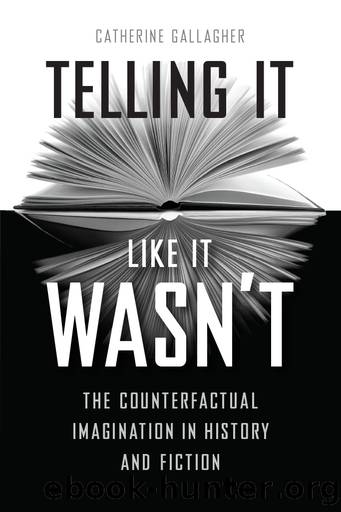Telling It Like It Wasn't by Catherine Gallagher

Author:Catherine Gallagher [Gallagher, Catherine]
Language: eng
Format: epub
Tags: History, General, Historiography, Literary Criticism
ISBN: 9780226512556
Google: J19CDwAAQBAJ
Publisher: University of Chicago Press
Published: 2018-01-26T22:22:44+00:00
CHAPTER FIVE
Nazi Britain: The Invasion and Occupation That Werenât
World War II, we are frequently reminded, was Americaâs good war, the one we are happy to remember: the one that was fought by the Greatest Generation and ended the Great Depression, that made America the leader of the free world and placed it at the summit of global power. The one in which we triumphed almost unconditionally over our enemies. In the seventy-some years since the warâs end, historical research has only deepened our sense of our enemiesâ perniciousness, especially when recollecting Nazi Germanyâs brutal and horrendous crimes. In hindsight, the Third Reich looks even more like evil incarnate than it did in December 1941 when America entered the war. The historical studies inspire certainty rather than doubts about the significance of the contest and the comparative moral values of the participants; they do not make us wonder if the world would have been substantially the same in the event of an Axis victory or stimulate second guesses about the importance of having joined the effort.
Thus, World War II seems to occupy the polar opposite position from that of the Civil War in the American historical imagination. Civil War memories, which we examined in the last two chapters, are steeped in regret, and they cause continuing divisions, while memories of World War II are filled with pride and celebrations of our common commitment to democracy. Instead of forcing us to face Americaâs history of slavery, World War II allows us to imagine ourselves as the saviors of enslaved peoples. And in no way was the war our fault; it was âover there,â a foreign international conflict into which we were compelled by an unprovoked act of blatant aggression against us. We are thus free to think of ourselves as innocent victims of a genuine axis of evil and heroes of its overthrow. In short, Civil War history, always threatening to expose the latent fractures under our unity, divides us, while WWII history unites us again.
And so, inevitably, the American counterfactual discourses surrounding the two wars show an equally stark contrast. Civil War counterfactuals make us debate the sincerity of our nationâs motives, and they continue to inspire feelings of futility as well as charges of hypocrisy, especially when we confront the quick reinstatement of the racial status quo ante. Civil War alternate histories have consequently run the gamut from idealizations to demonizations of a victorious South. Seventy years after the end of the Civil War, in 1935, the implicitly counterfactual-historical consensus declared it to have been largely unnecessary and perhaps counterproductive. Contrast that with the judgment of World War II seventy years after its end; in 2015 historians still believed in the validity of the Alliesâ future conditional assertions: if Britain had capitulated, if America had not entered the fight, if the Soviet Unionâs resolve had broken, then our world right up until the present would have been a much worse place to live for most of the planetâs people. Of
Download
This site does not store any files on its server. We only index and link to content provided by other sites. Please contact the content providers to delete copyright contents if any and email us, we'll remove relevant links or contents immediately.
4 3 2 1: A Novel by Paul Auster(12358)
The handmaid's tale by Margaret Atwood(7734)
Giovanni's Room by James Baldwin(7307)
Asking the Right Questions: A Guide to Critical Thinking by M. Neil Browne & Stuart M. Keeley(5745)
Big Magic: Creative Living Beyond Fear by Elizabeth Gilbert(5731)
Ego Is the Enemy by Ryan Holiday(5398)
The Body: A Guide for Occupants by Bill Bryson(5067)
On Writing A Memoir of the Craft by Stephen King(4921)
Ken Follett - World without end by Ken Follett(4711)
Adulting by Kelly Williams Brown(4556)
Bluets by Maggie Nelson(4536)
Eat That Frog! by Brian Tracy(4503)
Guilty Pleasures by Laurell K Hamilton(4428)
The Poetry of Pablo Neruda by Pablo Neruda(4083)
Alive: The Story of the Andes Survivors by Piers Paul Read(4013)
White Noise - A Novel by Don DeLillo(3993)
Fingerprints of the Gods by Graham Hancock(3980)
The Book of Joy by Dalai Lama(3963)
The Bookshop by Penelope Fitzgerald(3829)
